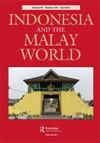“文化冷战”?
IF 0.9
3区 社会学
0 ASIAN STUDIES
引用次数: 0
摘要
摘要本文考察了20世纪50年代和60年代西爪哇人民文化研究所(Lembaga Kebudayan Rakyat,Lekra)的发展。这篇文章借鉴了当代出版物、口述历史和档案文献,将“来自下方”的观点融入到对一股充满活力的文化力量的描述中。它展示了Lekra如何吸引了文化精英,但也融入了日常生活,成为与印尼共产党有联系的组织网络的一部分。西爪哇的Lekra将外向型的文化外交与改革巽他文化的努力结合在一起。西爪哇的一些事态发展与国家趋势平行,包括勒克拉日益加剧的政治化和日益加剧的文化两极分化。然而,该省的发展也有其自身的动力,表现在杰出的巽他人Lekra人物对“瓦扬争议”的贡献,以及一群巽他作家的角色,他们拒绝在Lekra和支持《文化宣言》的竞争团体之间做出选择。这篇文章强调了将冷战框架应用于非殖民化世界的文化生活所面临的挑战,以及超越首都精英,融入各省和基层观点的必要性。本文章由计算机程序翻译,如有差异,请以英文原文为准。
A ‘cultural Cold War’?
ABSTRACT This article examines the development of the Institute of People’s Culture (Lembaga Kebudayaan Rakyat, Lekra) in West Java in the 1950s and 1960s. Drawing on contemporary publications, oral histories and archival documents, the article incorporates views ‘from below’ into an account of what became a vibrant cultural force. It shows how Lekra attracted a cultural elite but also wove itself into everyday life, as part of a web of organisations linked to the Indonesian Communist Party. Lekra in West Java combined an outward looking engagement in cultural diplomacy with efforts to reform Sundanese culture. Some developments in West Java paralleled national trends, including Lekra’s intensifying politicisation and growing cultural polarisation. However, developments in the province also had their own dynamics, manifesting in the contributions of prominent Sundanese Lekra figures to the ‘wayang controversy’ and in the role of a group of Sundanese writers who rejected the choice between Lekra and a rival group supporting the Cultural Manifesto. The article highlights challenges in applying a Cold War framework to cultural life in the decolonising world, and the need to move beyond elites in capital cities to incorporate views from the provinces and the grassroots.
求助全文
通过发布文献求助,成功后即可免费获取论文全文。
去求助
来源期刊

Indonesia and the Malay World
ASIAN STUDIES-
CiteScore
2.00
自引率
0.00%
发文量
17
期刊介绍:
Indonesia and the Malay World is a peer-reviewed journal that is committed to the publication of scholarship in the arts and humanities on maritime Southeast Asia. It particularly focuses on the study of the languages, literatures, art, archaeology, history, religion, anthropology, performing arts, cinema and tourism of the region. In addition to welcoming individual articles, it also publishes special issues focusing on a particular theme or region. The journal is published three times a year, in March, July, and November.
 求助内容:
求助内容: 应助结果提醒方式:
应助结果提醒方式:


